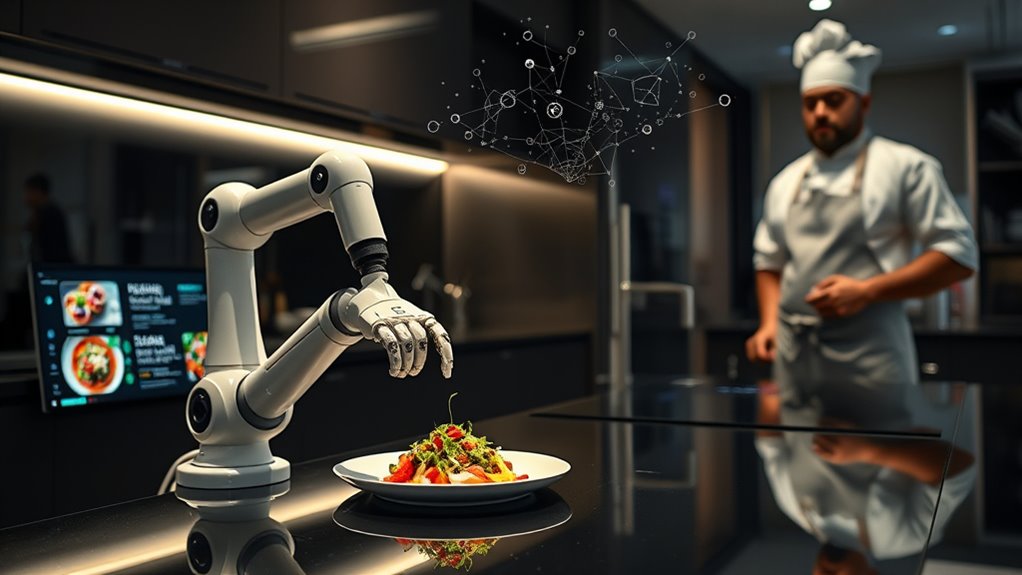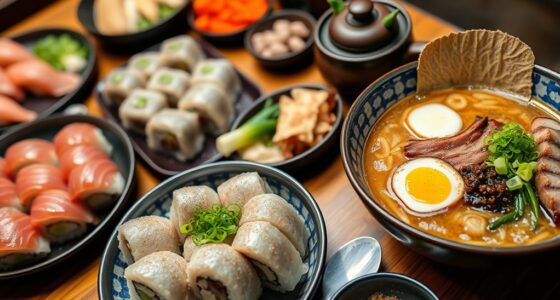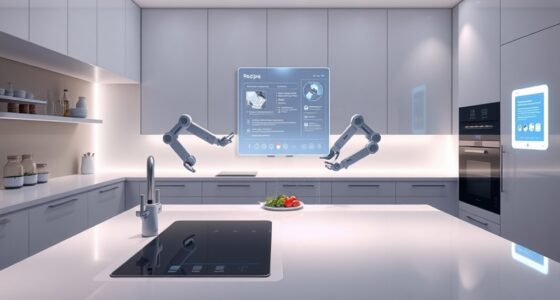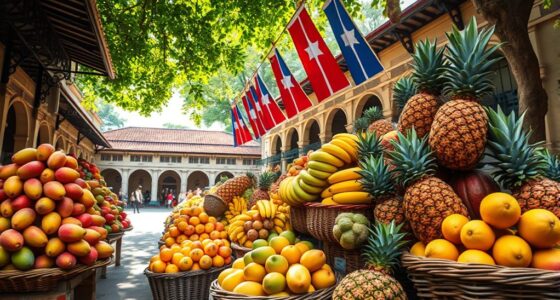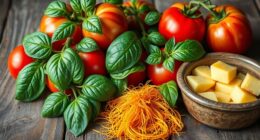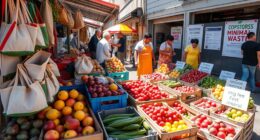AI is transforming the food industry by helping you produce safer, higher-quality products through smart monitoring, contamination detection, and optimized supply chains. It also automates cooking, personalizes recipes, and enhances your shopping experience with tailored recommendations. From farm fields to your table, AI improves sustainability, reduces waste, and addresses labor shortages. If you’re curious about how these innovations are shaping your food choices, you’ll find many exciting details ahead.
Key Takeaways
- AI enhances crop monitoring and pest detection, increasing yield while promoting sustainable farming practices.
- Automation of food preparation and service reduces labor costs and ensures consistent quality.
- Machine learning improves food safety by identifying contamination and spoilage early in the supply chain.
- Personalized marketing and recommendation systems enhance consumer experience and encourage healthier choices.
- Integration of AI with other technologies shapes innovative food production, entertainment, and lifestyle experiences.
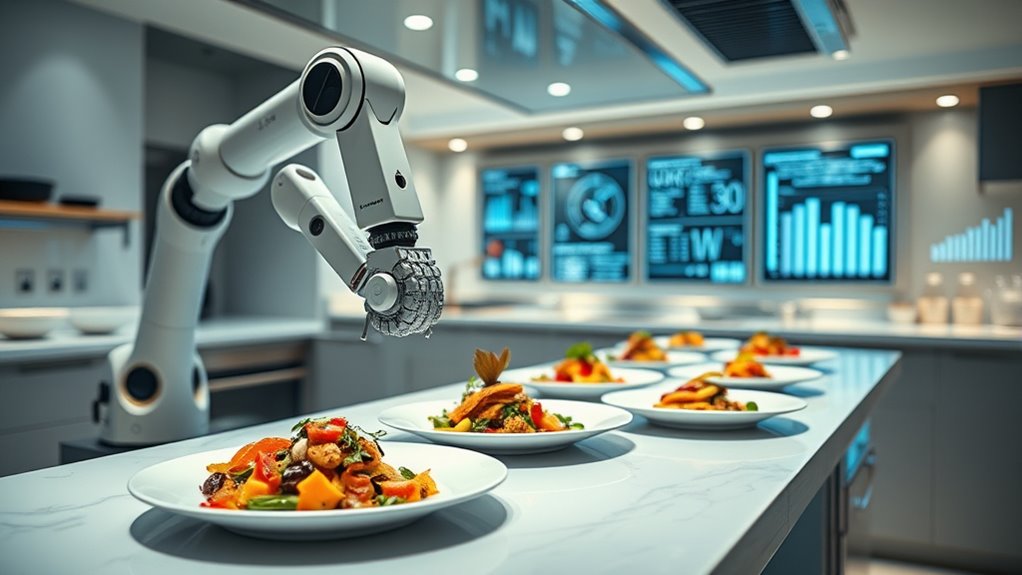
Have you ever wondered how artificial intelligence is transforming the food industry? It’s changing the way food is produced, prepared, and even consumed. AI-driven systems are streamlining processes that once relied heavily on manual labor and guesswork.
For example, farms now use AI-powered drones and sensors to monitor crop health, optimize watering schedules, and detect pests early. This technology helps farmers make smarter decisions, increasing yield while reducing waste and the use of harmful chemicals. You mightn’t see these changes directly, but they’re making food production more sustainable and efficient behind the scenes.
In the kitchen, AI is revolutionizing the way restaurants and home cooks create meals. Some companies develop intelligent recipe apps that analyze what ingredients you have on hand and suggest recipes tailored to your preferences. These apps learn from your cooking habits over time, offering personalized recommendations that suit your taste and dietary needs.
AI-powered machines are also automating food preparation tasks. Robots can now flip burgers, assemble sandwiches, and even prepare complex dishes, reducing wait times and ensuring consistency in quality. This automation not only speeds up service but also helps address labor shortages in the industry.
Moreover, AI is enhancing food safety and quality control. Companies employ machine learning algorithms to identify contamination or spoilage in food products quickly. High-resolution image analysis can detect imperfections or foreign objects in produce and packaged goods, ensuring only the best quality items reach consumers.
This reduces food waste and increases consumer confidence in the products they buy. AI systems can also predict demand more accurately, helping retailers manage inventory better and minimize excess stock that might spoil before sale.
In addition, AI is shaping consumer experiences through personalized marketing and product recommendations. By analyzing purchasing data and browsing habits, companies can suggest new products that align with your preferences. This tailored approach encourages healthier choices and introduces you to new flavors or dietary options you mightn’t have discovered otherwise.
Furthermore, AI-driven chatbots and virtual assistants can answer your questions about ingredients, nutritional information, or cooking tips, making your food-related decisions easier and more informed.
Recent advancements in home theatre projectors are also influencing entertainment experiences at home, enhancing how consumers enjoy their media and integrate new technology into their lifestyles.
Frequently Asked Questions
How Does AI Improve Food Safety and Traceability?
You can see AI improving food safety and traceability by quickly analyzing data to spot contamination risks and prevent outbreaks. It tracks ingredients from farm to table, ensuring transparency and accountability.
With AI-powered sensors and blockchain, you get real-time updates on product freshness and origin. This means fewer recalls, safer food, and increased consumer confidence.
AI makes the entire supply chain more reliable, helping you make informed choices and stay protected.
What Are Ai’s Environmental Impacts in Food Production?
You might think AI’s environmental impact is a drop in the ocean, but it actually plays a significant role. It helps reduce waste by optimizing resource use, lowers energy consumption, and minimizes greenhouse gases through smarter farming and supply chain management.
While AI can boost sustainability, it also consumes energy itself, so you need to strike a balance. Overall, AI’s environmental footprint depends on how it’s implemented in food production.
Can AI Help Reduce Food Waste Effectively?
You can use AI to cut food waste by optimizing inventory levels and predicting demand accurately. AI-powered systems analyze sales data, weather patterns, and consumer trends to help you stock just the right amount of products, reducing excess.
Additionally, AI can identify spoilage patterns and suggest better storage methods. By implementing these tools, you make smarter decisions, waste less food, and contribute to a more sustainable food system.
How Does AI Personalize Dietary Recommendations?
AI personalizes dietary recommendations by analyzing your health data, preferences, and eating habits. It learns from your input and ongoing feedback to suggest foods that suit your goals, whether it’s weight management, allergy avoidance, or specific nutrient needs.
What Ethical Concerns Arise From AI in Food Industry?
You should consider the ethical concerns AI brings to the food industry. It can lead to privacy issues, as personal data is collected for tailored recommendations.
Bias in algorithms might cause unfair treatment or limit options for certain groups.
Additionally, there’s the risk of reduced transparency, making it hard for consumers to understand how decisions are made.
These issues highlight the need for careful regulation and ethical standards.
Conclusion
As you step into the future of food, AI paints a vibrant picture—fresh ingredients perfectly paired, flavors tailored just for you, and kitchens buzzing with precision. It’s like a symphony where technology and taste dance together, creating a seamless dining experience. With every byte and bite, AI transforms your culinary world into a lively, innovative landscape—where your next meal is not just made, but crafted with care, imagination, and a touch of digital magic.
